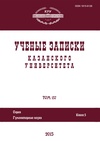Влияние буддизма школы Сингон на формирование социокультурных практик японских боевых искусств
The Influence of Shingon Buddhism on the Formation of Sociocultural Practices of Japanese Martial Arts
Author(s): A. E. LestevSubject(s): Anthropology, Ethnohistory, Sociology of Culture
Published by: Казанский (Приволжский) федеральный университет
Keywords: martial arts; Shingon; Buddhism; history of Japan; warrior’s culture; socio-cultural practices;
Summary/Abstract: The reception of sociocultural practices of the esoteric schools of Buddhism by the schools of Japanese martial arts was analyzed. Based on the methods of cultural and interpretive anthropology, the rituals, training methods, specific techniques, and philosophical concepts of martial arts influenced by Shingon Buddhism were discussed. The reflection of Shinto-Buddhist syncretism in the traditions of martial arts schools, by the example of the Hachiman cult and the Marishiten cult, was discussed. It was concluded that Buddhist sects were the rich sources of sociocultural practices for martial arts schools. At the same time, the borrowed practices underwent essential changes, because they were meant to achieve mastery in the martial art, rather than a religious desire to achieve the state of a Buddha. From this point of view, special military rituals were also evaluated. The obtained results allow a better understanding the process and mechanism of the recipes of sociocultural practices between different social groups within one nation. It was suggested that religious rituals and amulets in martial arts had their practical purpose for the psychological mood before the battle.
Journal: Ученые записки Казанского университета. Серия Гуманитарные науки
- Issue Year: 160/2018
- Issue No: 6
- Page Range: 1466-1477
- Page Count: 12
- Language: Russian

